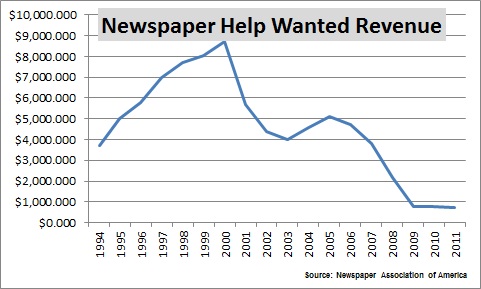Remember when recruiters spent Mondays fielding calls prompted by help-wanted ads in the Sunday paper?
It wasn’t that long ago — not even a dozen years ago — that newspapers were where the recruitment dollars went. In 2000, the watershed year for newspaper employment advertising, the take came to nearly $9 billion, and some newspapers — the Dallas Morning News and the (San Jose) Mercury News in particular — had Sunday help-wanted sections larger than today’s entire editions.
Last year, according to the Newspaper Association of America, employment advertising revenue was $743.4 million, far below the $1.1 billion in North American revenue of industry leaders CareerBuilder and Monster. The last time newspaper employment revenue was this low was in 1977 when it totaled $589.4 million. In today’s dollars, that would be $2.2 billion.
Falling further behind
While newspapers have aggressively moved online, they’re falling further and further behind, studies from the Pew Research Center show. For every $1 in new online revenue, newspapers last year lost $10 in print ad revenue. That was worse than in 2010 when they lost $7 for every new $1 in digital ad revenue.
 Many newspapers are experimenting with charging for their online content. The New York Times began charging for full access a year ago and now has about 400,000 subscribers. Many other newspapers are now beginning to charge or report plans to do so by year’s end.
Many newspapers are experimenting with charging for their online content. The New York Times began charging for full access a year ago and now has about 400,000 subscribers. Many other newspapers are now beginning to charge or report plans to do so by year’s end.
There’s considerable doubt that charging for content will do much more than stabilize the loss of print subscriptions. Nielsen, the market research firm, found only 19 percent of American tablet users paid for news content last quarter. Compare that to the 62 percent who paid for music and the 51 percent who paid for a movie, and its clear how much distance the newspaper industry has to go.
However, employment revenue, once of the single largest ad categories for the print industry, is unlikely to return. Several years ago, as the decline in print help-wanteds began to become evident, newspapers started cooperating with job boards. CareerBuilder, was bought by a partnership of three newspaper publishers. A few years later, Dan Finnigan, now CEO of Jobvite, masterminded a broad collaboration of newspapers with Yahoo!’s HotJobs, which he then headed up.
LinkedIn revenues growing rapidly
Two years ago, when HotJobs was sold to Monster, the company inherited hundreds of newspaper partners who took a percentage of every ad sold via their call centers or online ordering. Now, with Monster potentially for sale or dismantling, the future of the newspaper network is in jeopardy.
The troubles are only compounded by the rise of social media, and especially by LinkedIn, which is growing its recruitment revenue more quickly than any of its job board competitors. Yet job boards themselves continue to show they produce more hires than every other source but referrals. Print as a source of hires falls far down the list.
So even as newspaper executives predict the curtailment and eventual demise of print editions altogether, the industry’s path to online revenue is not at all clear.
“Fifteen years into the digital transition, executives still feel they are in the early stages of figuring out how to proceed,” Pew researchers report.
